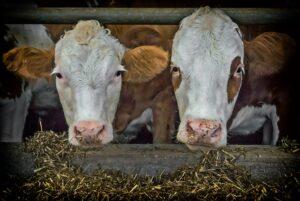The world’s first environmentally friendly milk is here
A small Tasmanian dairy, Ashgrove, has become the world’s first to launch an ‘eco-friendly’ milk that could be a major step towards sustainable agriculture. In an innovative way, the plant fed its dairy cows with seaweed, thanks to which the animals emitted less environmentally harmful methane gas. According to UN data, the livestock sector is responsible for about 30% of global methane emissions, so such solutions can have a significant impact on the environment.

Since February, Ashgrove has been feeding around 500 cows – a fifth of the herd – an oil containing seaweed extract, which reduces methane released during cow digestion. According to co-owner Richard Bennett, this method resulted in a methane reduction of about 25%. The cows produce about 10,000 liters of milk per day, part of which is bottled under the name “Eco-Milk” and sold throughout Tasmania, including in Australia’s largest supermarket chain, Woolworths, reports the Agricultural Sector.
The introduction of Eco-Milk serves as a test of whether consumers are willing to pay more for dairy products with a lower environmental impact. A two-liter bottle retails for A$5.50 ($3.67), which is twenty-five cents more than regular milk. Initial sales figures are positive, but the company has yet to decide whether to expand the project to larger groups.
The additive used by Ashgrove is supplied by a Tasmanian company, Sea Forest. The company’s CEO, Sam Elsom, hopes Eco-Milk will be popular with customers. If consumers do not support these products, the pace of decarbonisation will be slower. However, using seaweed is not cheap, as feed additive manufacturers have invested hundreds of millions of dollars to produce enough to feed animals.
Related news
40 secure jobs, sustainable solutions – new BURGER KING® in Csepel
🎧 Hallgasd a cikket: Lejátszás Szünet Folytatás Leállítás Nyelv: Auto…
Read more >Carrefour and Coca-Cola are focusing on refillable glass bottles
🎧 Hallgasd a cikket: Lejátszás Szünet Folytatás Leállítás Nyelv: Auto…
Read more >Fashion, drones and sustainability – the new face of agriculture at the AgriTech InnoExpo event
🎧 Hallgasd a cikket: Lejátszás Szünet Folytatás Leállítás Nyelv: Auto…
Read more >Related news
MBH Analysis Center: The Hungarian economy may accelerate again in 2026, but the Iranian war carries serious risks
🎧 Hallgasd a cikket: Lejátszás Szünet Folytatás Leállítás Nyelv: Auto…
Read more >Together for the future: dm supports projects that also offer opportunities for volunteer work with 50 million forints
🎧 Hallgasd a cikket: Lejátszás Szünet Folytatás Leállítás Nyelv: Auto…
Read more >







